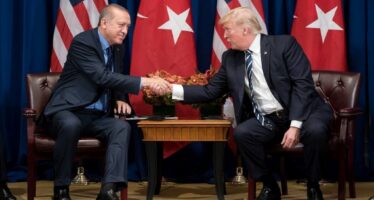Assad: Syria operations halted
![]()
President tells UN that police and military operations have ended, as world body set to discuss country’s crackdown
Military and police operations against protesters in Syria have stopped, Syrian President Bashar al-Assad told United Nations Secretary-General Ban Ki-moon, the world body said in a statement.
The announcement comes ahead of a UN Security Council meeting on Thursday at which the UN’s human rights chief, Navi Pillay, could call for Syria’s crackdown on protesters to be referred to the International Criminal Court, according to diplomats.
In a phone call with Assad on Wednesday, Ban “expressed alarm at the latest reports of continued widespread violations of human rights and excessive use of force by Syrian security forces against civilians across Syria, including in the Al Ramel district of Lattakia, home to several thousands of Palestinian refugees,” the United Nations said in a statement. 
“The Secretary-General emphasized that all military operations and mass arrests must cease immediately. President Assad said that the military and police operations had stopped,” the statement added.
Pillay, head of the Office of the High Commissioner for Human Rights (OHCHR), is expected to address the 15-nation Security Council in a closed-door session on Syria on Thursday, along with UN humanitarian chief Valerie Amos.
Pillay will say a “thorough appropriate international investigation is needed,” said a diplomat speaking to Reuters anonymously, adding that Pillay was “likely to suggest that the ICC would be appropriate”.
“OHCHR (Pillay’s office) have indicated that their Syria report will find evidence that Syria has committed grave
violations of international human rights law in its actions dealing with protesters over the past five months,” the diplomat said.
The government’s crackdown in Syria is estimated to have killed at least 2,000 civilians since the protests began in March.
Defying international calls
Assad’s government has defied international calls for an end to the crackdown on the five-month-old uprising.
In comments carried on the state-run news agency, Assad told members of the ruling Baath Party that Syria would not give up its “dignity and sovereignty”.
The government insists its crackdown is aimed at rooting out “terrorist groups” it says are creating unrest in the country.
Syrian troops ‘withdraw’ from eastern city
According to activists, Assad has unleashed tanks, ground troops, snipers and warships in an attempt to retake control in rebellious areas.
The military assault has escalated dramatically since the start of the Muslim fasting month of Ramadan in August, with hundreds reported killed and thousands arrested.
Recep Tayyip Erdogan, the Turkish prime minister, on Wednesday said Assad had not heeded his government’s call to stop targeting civilians.
Erdogan said he personally spoke to Assad and sent his
foreign minister to Damascus, but “despite all of this, they are continuing to strike civilians”.
On Wednesday, Tunisia recalled its ambassador to Syria because of “dangerous” developments.
Switzerland widened sanctions against the Syrian government, adding 12 more individuals to a list of officials under financial embargo and travel restriction, the AFP reported.
Raids in Damascus
Meanwhile, security forces in Damascus raided homes and shops on Wednesday and arrested dozens of activists in Rukn Eddin district, known to be a predominantly Kurdish area, where electricity was cut off.
Scores of others were arrested on the outskirts of the capital, activists said. By late Wednesday, a Syrian human rights group said 10 protesters were killed and dozens injured in Homs. According to activists, security forces opened fire in Latakia, Aleppo, Hama, and Homs.
Syrian state media claimed earlier on Wednesday that security forces had withdrawn from the city of Deir ez-Zor and areas of Latakia, but witnesses rejected the reports. Ahmet Davutoglu, the Turkish foreign minister, also said Syrian troops were still in Deir ez-Zor.
“I can confirm that Deir ez-Zor is still witnessing problems and the army is in Deir ez-Zor and other towns,” he said, speaking at a news conference in Istanbul with his Jordanian counterpart Nasser Judeh.
Witnesses on the ground also disputed the government’s announcements, saying tanks were still present at the outskirts of Deir ez-Zor and that troops raided houses looking for dissidents.
Syria’s interior ministry said security forces had also completed their operation in the al-Ramel al-Janoubi neighbourhood of the coastal city of Latakia, which had been subjected to days of assault.
But Al Jazeera’s Nisreen el-Shamayleh, reporting from Ramtha, on the Syria-Jordan border, said witnesses reported conflicting accounts.
“Activists told us that on Tuesday night and early on Wednesday morning, specifically at 8am local time on Wednesday, heavy gunfire was heard across neighbourhoods in Latakia and that two Palestinians were killed on Tuesday night,” said Shamayleh.
Related Articles
The Real Reasons why US-Turkey Relations Have Hit an All-Time Low
![]()
If you’ve been watching the news over the past week you may think the current hostility between Washington and Ankara is about the US pastor, Andrew Brunson
Turkey’s play with Syrian Kurds
![]()
ABDULLAH BOZKURTThe high-stakes game plan for Turkey to control the fast-paced developments in northern Syria using the Kurdistan Regional Government
Los expertos en geopolítica dicen que un ataque a Irán plantea inmensos riesgos
![]()
Petróleo Jim Lobe Common Dreams Traducido del inglés para Rebelión por Germán Leyens Como bastión del realismo en política exterior, el




